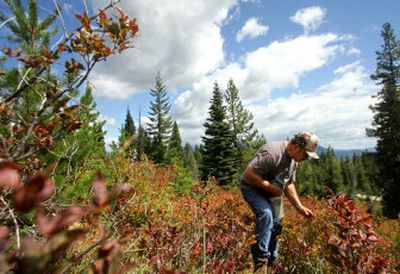Huckleberry harvesters disrespectful, Indians say

TROUT LAKE, Wash. – Huckleberries are part of the cultural history of the Yakama Nation, but tribal members have found few berries on hillsides so far this season. They place the blame squarely on commercial pickers, saying the visitors don’t respect nature, the berries or treaty rights.
“The only way we know the huckleberries will be ripe is when we see chokecherries,” said Mavis Kindness, a Yakama elder who has participated in huckleberry harvests since she was a child. “But you have pickers go up there too early and they aren’t respecting the rules.”
Huckleberries grow wild in various areas throughout Montana, Idaho, Utah, Oregon and Washington. The berries prefer elevations of 4,000 to 6,000 feet.
In Washington, areas near Mount Adam and the Yakama Indian Reservation are especially fertile for the berries because of the altitude and the late snowpack that protects the berries from an early freeze.
The U.S. Forest Service oversees much of the area as part of its management of the Gifford Pinchot National Forest. The agency delayed the opening of this year’s berry harvest until Aug. 15 in an attempt to recognize Yakama treaty rights to the berries, said Fred Dorn, who oversees special forest products for the agency.
Still, it’s a balancing act.
“On one hand we have to honor the handshake agreement we have with the Yakamas, and then you have to remember it’s a public resource,” he said.
Dorn concedes that commercial pickers largely ignored the later start date.
Three days into the official start date for berry picking last Thursday, not a commercial picker was in sight, but a discarded heavy-duty garbage bag left behind was evidence they had been there.
Aside from waiting for the chokecherries to ripen, the Yakamas don’t officially open the huckleberry harvest until after a formal feast dedicated to the fruit, blue or red uncultivated cousins to the blueberry.
Recreational pickers are permitted to take just 3 gallons per year. Commercial pickers fill garbage bags, raking the shrubs to get the most berries as quickly as possible and damaging the shrubs in the process, the Yakamas contend.
A sign on one side of the road into the Gifford Pinchot National Forest from the tiny town of Trout Lake in south-central Washington implores pickers to respect native culture and reserve the berries there for the Yakamas.
But Kindness says commercial pickers no longer respect the sign and don’t like it when they are told they shouldn’t be there. Some intimidate the Yakamas, who traditionally spend about six weeks during late summer camping in the forest and harvesting berries.
“We feel invaded,” Kindness laments, “and our elders don’t feel safe picking.”
Compounding the problem, this year’s crop of berries seems particularly slim after last year’s record harvest.
Dorn said the Forest Service is considering a limit on the number of permits it hands out, but with only a handful of people to enforce regulations, it might not do much good.
“You just have more and more people looking for opportunities to make money off public resources,” he said.